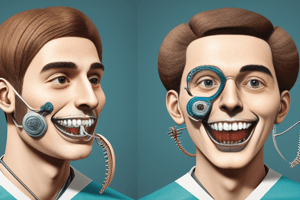Podcast
Questions and Answers
What has been proposed as an alternative for orthodontists to bond orthodontic brackets?
What has been proposed as an alternative for orthodontists to bond orthodontic brackets?
Bonding traditional composite restoratives with orthodontic brackets
What is the primary advantage of using light-activated composites for orthodontic bracket bonding and restorative dentistry?
What is the primary advantage of using light-activated composites for orthodontic bracket bonding and restorative dentistry?
The primary advantage is that they benefit from advances in light activation.
What test has been used to assess the appropriateness of bonding brackets with composite restoratives?
What test has been used to assess the appropriateness of bonding brackets with composite restoratives?
Shear bond strength (SBS) test
What is the main difference between orthodontic adhesives and composites?
What is the main difference between orthodontic adhesives and composites?
What has been demonstrated to increase the flowability of composite restoratives?
What has been demonstrated to increase the flowability of composite restoratives?
What is a limitation of composite restoratives in bonding with orthodontic brackets?
What is a limitation of composite restoratives in bonding with orthodontic brackets?
What is the minimum shear bond strength required for an orthodontic resin to fulfill clinical expectations?
What is the minimum shear bond strength required for an orthodontic resin to fulfill clinical expectations?
What is the primary component of orthodontic composite resins and restorative dentistry composite resins?
What is the primary component of orthodontic composite resins and restorative dentistry composite resins?
What is a potential benefit of preheating composite restoratives?
What is a potential benefit of preheating composite restoratives?
How have dental composites traditionally been categorized?
How have dental composites traditionally been categorized?
What is the benefit of using inorganic filler material in orthodontic composite resins and restorative dentistry composite resins?
What is the benefit of using inorganic filler material in orthodontic composite resins and restorative dentistry composite resins?
Who introduced the acid etch bonding process in 1955?
Who introduced the acid etch bonding process in 1955?
What are the three classifications for filler particles in resin composites?
What are the three classifications for filler particles in resin composites?
What has not been studied in relation to bonding orthodontic brackets?
What has not been studied in relation to bonding orthodontic brackets?
What type of composites have been recommended for bracket bonding instead of orthodontic composites?
What type of composites have been recommended for bracket bonding instead of orthodontic composites?
What is the primary similarity between orthodontic composite resins and restorative dentistry composite resins?
What is the primary similarity between orthodontic composite resins and restorative dentistry composite resins?
Flashcards are hidden until you start studying
Study Notes
Advances in Light Activation for Orthodontic Bracket Bonding
- Light activation has led to advancements in composites designed for orthodontic bracket bonding and restorative dentistry.
- Research has demonstrated the efficacy of adhesive methods available for bonding orthodontic equipment.
Orthodontic Adhesives vs. Composites
- Orthodontic adhesives share a fundamental composition with composites but are usually only commercially available from vendors specializing in orthodontic materials.
- Orthodontists prefer to use these systems, possibly due to the greater uniformity of these materials.
History of Orthodontic Resins
- Buonocore introduced the acid etch bonding process in 1955, leading to the use of various resins in restorative dentistry applications, including orthodontic bracket bonding.
- Reynolds stated that an orthodontic resin needs to have a shear bond strength of 5.88–7.84 MPa to fulfill clinical expectations.
Composition of Orthodontic Composite Resins
- Orthodontic composite resins are similar to restorative dentistry composite resins in foundation.
- They consist of approximately 75% inorganic filler material, initiators, and an organic matrix (Bis-GMA, TEGMA).
- The filler content enhances the mechanical properties of the material, such as strength and wear resistance.
Low-Viscosity Flowable Composites
- Low-viscosity flowable composites have been recommended for bracket bonding due to their composition's resemblance to restorative dentistry composite resins.
- Bonding brackets with composite restoratives has been proposed as an alternative option for orthodontists.
Shear Bond Strength (SBS) Test
- The SBS test has been used to assess the appropriateness of composite restoratives for bonding orthodontic brackets.
- Some studies have reported lower SBS mean values for composite restoratives, but preheating these materials before photo activation can increase their flowability and enhance the degree of conversion.
Preheating Composite Restoratives
- Preheating composite restoratives can improve the polymer network's mechanical strength and lead to a more acceptable SBS.
- Preheating has been promoted as a way to increase monomer transformation, improve peripheral adaptability, and improve composite flow.
Classification of Filler Particles
- Dental composites have been categorized based on the properties of the filler, namely the size of the particles.
- Three classifications for filler particles in resin composites have been proposed: nanocomposites, micro-filled composites, and micro-hybrid composites.
Studying That Suits You
Use AI to generate personalized quizzes and flashcards to suit your learning preferences.




